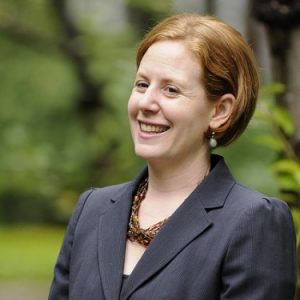Researcher Profile: CSFS Associate Jennifer Black
UBC Associate Professor in Food, Nutrition, and Health (FNH), in the Faculty of Land and Food Systems

What is your research project and what is it all about?
I worked on the first iteration of the Think&EatGreen@School Project. This project was a five-year SSHRC-funded community-university research alliance project that was led by the late great Alejandro Rojas, who we miss very much around LFS. The project had the aim of bringing colleagues and students from UBC together with stakeholders from across the Vancouver School Board to think about schools as a space to integrate ideas around healthy and sustainable school food systems and to connect students and communities with food systems work. While that project officially wrapped up around 2015, the legacy of the project continues with work that Lisa Powell is continuing at the CSFS. Other graduate students have also carried on elements of inquiry and research around school food systems and the dietary quality of children. I am now working another local school board who is trying to improve access to nutritious foods for children in BC.
I have recently published papers related to the work I was doing with the Greater Vancouver Food Bank Society. They had originally come to UBC looking for support to help better understand who their members are, what brings them to food banks, what kinds of needs they have, and how community-based organizations can support them and become advocates for poverty reduction.
What’s next for this project?
For the Think&EatGreen@School project, I’m trying to see if I can assess some natural experiments in schools that are trying to change their local food systems and food programs to see if those programs actually have an impact on improving student well-being and dietary quality. I’m trying to think about better ways to utilize national health data sets to understand the impacts of food insecurity on Canadians and potential policy solutions to mitigate those challenges.
Why does this work matter to you?
This work matters to me because I care about health equity and I care about ensuring that all Canadians can live a healthy, productive life that allows them to meet their full potential. Making sure that people have access to food (and dignity).
Why did you get into this line of work in the first place?
The clear “aha” moment for me was when I had graduated and become a young dietitian and I was working in health clinics in very low income neighborhoods of New York City. I was trying to work with clients living with tremendous life challenges including poverty, systemic racism, discrimination, food insecurity, and domestic violence. At that time, I was trying to work with them on nutrition education aiming to lessen of the impacts of chronic disease in their lives. During my work, it was immediately clear that clients were constrained not just by their individual circumstances, but also by the context of the neighborhoods they were living in. In these areas, affordable, nutritious food was hard to acquire and opportunities, even for physical activity, in safe spaces were difficult to access, particularly for kids. That was what originally drove me to want to be able to measure and identify systematic barriers that made it harder for some people to meet the kinds of health recommendations dietitians were making to them.
What surprises you about this work?
Well, it doesn’t surprise me much anymore, but I guess, what continues to surprise me is how hard it is to measure a lot of the things that are of interest to my research and how messy the world is.
How important is the Centre for Sustainable Food Systems at UBC Farm to your work?
It would be wonderful to have a space that brings together multi-disciplinary thinkers to share resources and ideas around complex food systems issues and CSFS is one way we can do that.
What should people know about the UBC Farm that they probably don’t know?
It’s very sunny, bring a hat.
What’s your favourite thing to do at the UBC Farm?
I enjoy the Summer Farmers’ Market.